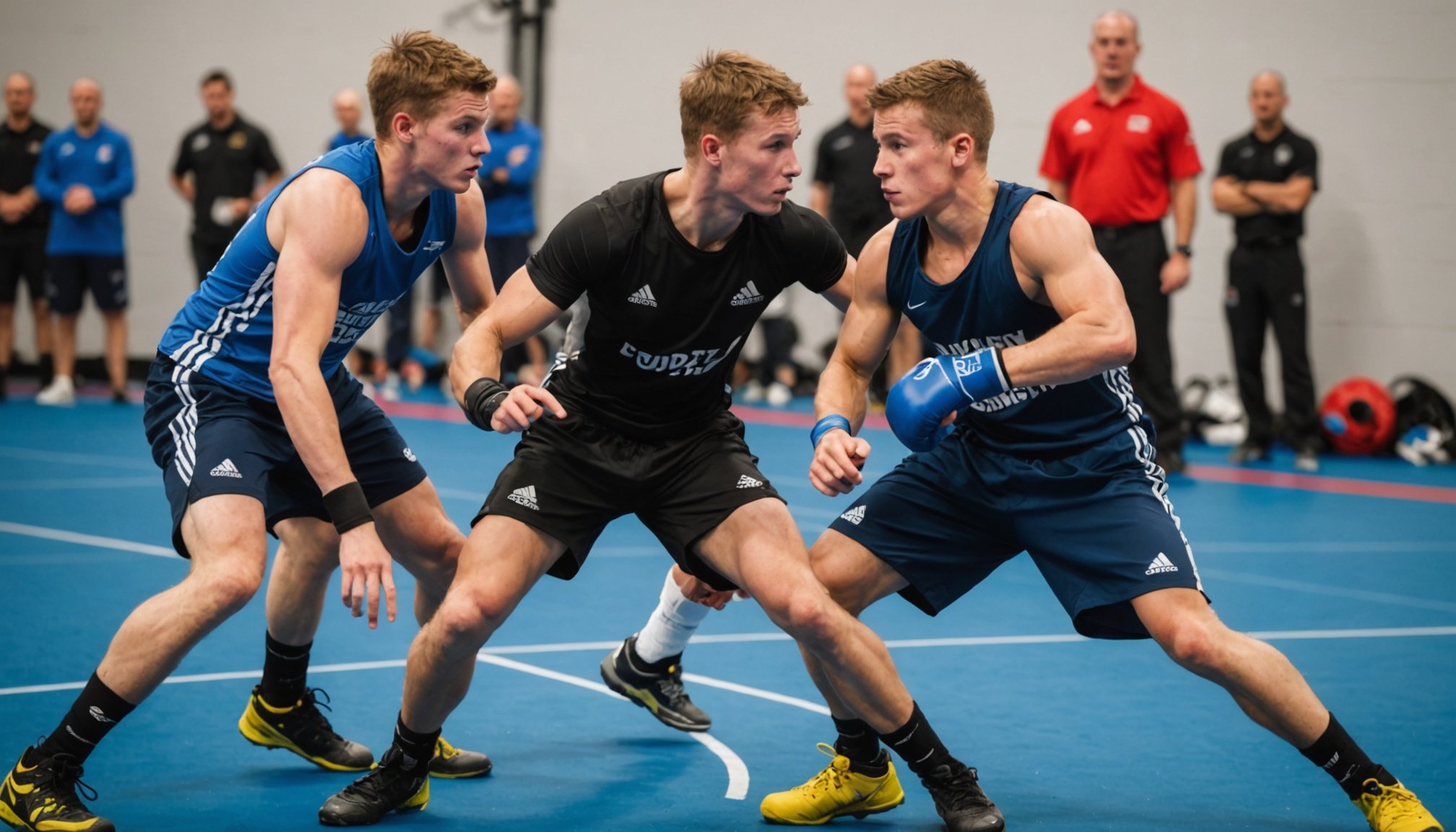Understanding Mental Toughness in Combat Sports
Mental toughness stands as a critical component in the realm of combat sports, shaping the dynamics of success and failure. It can be defined as the psychological edge that enables young athletes to cope better than their competitors with the many demands that combat sports present. This resilience allows them to remain determined, focused, and confident, even in the face of adversity or unexpected pressures.
Mentally tough athletes are characterised by several key traits. They exhibit unwavering determination, a resilient mindset, and the ability to maintain composure under stress. These qualities empower them to push through physical pain and fatigue, maintain concentration in heated bouts, and recover swiftly from setbacks.
Also read : Mastering Spinning Kicks: Effective Drills for UK Taekwondo Athletes to Elevate Performance
Moreover, the impact of mental toughness on performance is profound. Athletes who cultivate these traits often experience enhanced performance, as they can sustain high levels of effort and commitment over long periods. Their resilience not only contributes to immediate success in matches but also to their long-term development in combat sports. With these attributes, young athletes are better equipped to navigate the complex emotional landscape of their sport, ultimately leading to improved competitive outcomes.
Challenges Faced by Young Combat Sports Athletes
Young athletes in the combat sports environment often encounter various psychological stressors that can impact their performance and well-being. Competitive settings can create pressure to excel, which sometimes leads to stress and anxiety. This intense environment may demand mental fortitude, as young athletes strive to stay composed during high-stake matches.
Also to read : Unlocking Tactical Mastery: Strategies Used by UK Judo Competitors to Elevate Their Game
Another challenge is balancing academic and athletic commitments. The rigorous schedules of training and competition can clash with academic responsibilities, making it crucial for athletes to manage their time effectively. Keeping up with studies while meeting training demands requires discipline and often sacrifices.
External pressures from coaches and parents further compound these challenges. The desire to meet expectations from authority figures and family can add layers of stress to young athletes. While encouragement can be positive, constant pressure can become overwhelming, affecting both performance and mental health.
To navigate these challenges, it might be beneficial for young athletes to seek support from sports psychologists or mentors who can provide guidance. Finding a balance between sports and academics, and ensuring open communication with coaches and parents, can help mitigate stress and nurture a healthier combat sports experience.
Practical Strategies for Building Mental Toughness
In sports and other performance areas, building mental toughness is essential for achieving excellence. Here, we’ll explore strategies that focus on mental training and performance enhancement.
Goal Setting Techniques
Setting goals is crucial for motivation and improvement. Implementing SMART goals—Specific, Measurable, Achievable, Relevant, and Time-bound—ensures clarity and direction. Short-term goals offer immediate gratification, keeping individuals motivated, while long-term goals set the ultimate vision for success. It is vital to monitor progress regularly and celebrate achievements, no matter how small, to maintain momentum.
Visualization and Mental Imagery
Visualization, or mental imagery, is a potent tool for enhancing performance. By imagining successful outcomes, athletes can program their minds for success. Techniques such as ensuring vivid imagery and involving all senses can make visualization more effective. Incorporating it into daily training routines fosters familiarity with success-oriented scenarios.
Developing a Growth Mindset
A growth mindset, as opposed to a fixed mindset, nurtures the belief that abilities can be developed through dedication and hard work. Understanding this concept is crucial for resilience. Encouraging resilience involves learning from setbacks and treating failures as stepping stones. Creating a supportive training environment where individuals feel empowered to tackle challenges contributes significantly to mental fortitude.
Psychological Techniques to Enhance Resilience
Enhancing resilience requires psychological techniques that athletes can adopt to strengthen their mental and emotional toughness. By incorporating mental training strategies, athletes can navigate performance pressures more effectively.
Mindfulness and Stress Management
Mindfulness offers significant benefits for athletes by promoting clarity and calmness. To manage stress, athletes can engage in simple mindfulness exercises, such as focusing on their breath or practicing body scans. These activities not only help alleviate performance anxiety but also enhance awareness and concentration during competitions.
Building Confidence Through Preparation
Confidence is closely linked to preparation. Athletes who meticulously prepare through practice and repetition often exhibit increased self-efficacy. Engaging in positive self-talk and affirmations further cements confidence, enabling athletes to trust in their abilities and remain composed under pressure.
Support Systems and Mentorship
Having robust support systems is vital. Coaches and mentors play critical roles in athlete development by providing guidance and encouragement. Forming a peer support network enables athletes to share experiences and challenges, fostering a sense of community. Encouraging open communication about mental health ensures athletes do not feel isolated, making these support networks integral to maintaining motivation and resilience.
Case Studies and Examples of Success
Inspiring success stories of young athletes highlight not only their physical prowess but their mental resilience. Several UK combat athletes have stood out for their unique approaches to mental toughness. For instance, a young boxer from Manchester attributes his success to rigorous mental conditioning routines, emphasizing visualization techniques before every match. This practice has been a cornerstone in preparing him for high-pressure environments.
Lessons learned from such journeys show that mental resilience can dramatically alter one’s competitive edge. Athletes have shared that embracing setbacks as learning opportunities and maintaining a strong support network are pivotal. Community programs have been established to foster this resilience. Programs like the UK’s Youth Sports Trust Initiative aim to instill these mental skills early on, underscoring the significance of mental fortitude alongside physical training.
Combat sports clubs across the UK also prioritize building mental toughness through workshops focusing on stress management and motivational strategies. These initiatives not only improve performance but also support athletes’ overall well-being. The fusion of robust community support and personal determination exemplified by these case studies reinforces the importance of mental resilience in the world of competitive sports.
Expert Opinions and Research on Mental Toughness
In the realm of mental toughness, expert opinions from sports psychologists and coaches shed invaluable light on its development, particularly in youth sports. Sports psychologists emphasize the role of resilience and consistent practice in nurturing this trait. They argue that young athletes should face controlled challenges to build mental fortitude, a view supported by coaches who implement these techniques in training camps.
Current research findings on mental toughness underscore the significance of fostering a growth mindset in athletes. Studies reveal that athletes with a strong growth mindset are more likely to persevere through adversity, equipping them with the necessary mental tools for success. This approach involves understanding that abilities can be developed through dedication and hard work.
Recommendations for integrating these insights into training programs suggest introducing scenarios that mimic real-game pressures. By simulating high-stakes situations, young athletes learn to cope with stress, further enhancing their mental toughness. Additionally, incorporating psychological training sessions that focus on visualization and positive self-talk can be beneficial. These methods help athletes maintain focus and confidence, boosting their overall performance.
Coaches and programs that adapt such research-backed strategies are more likely to cultivate resilient athletes, ready to face the rigours of competitive sports with unwavering determination.











